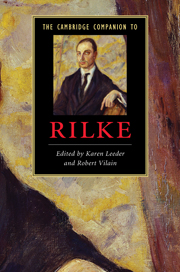Book contents
- Frontmatter
- Introduction
- PART I LIFE
- PART II WORKS
- PART III CULTURAL CONTEXTS, INFLUENCES, RECEPTION
- 8 Rilke and modernism
- 9 Rilke the reader
- 10 Rilke and the visual arts
- 11 Rilke: thought and mysticism
- 12 Rilke and his philosophical critics
- 13 Rilke’s legacy in the English-speaking world
- Appendix: Poem titles
- Guide to further reading
- Index
- Index of works
13 - Rilke’s legacy in the English-speaking world
from PART III - CULTURAL CONTEXTS, INFLUENCES, RECEPTION
Published online by Cambridge University Press: 28 July 2010
- Frontmatter
- Introduction
- PART I LIFE
- PART II WORKS
- PART III CULTURAL CONTEXTS, INFLUENCES, RECEPTION
- 8 Rilke and modernism
- 9 Rilke the reader
- 10 Rilke and the visual arts
- 11 Rilke: thought and mysticism
- 12 Rilke and his philosophical critics
- 13 Rilke’s legacy in the English-speaking world
- Appendix: Poem titles
- Guide to further reading
- Index
- Index of works
Summary
This chapter will trace the vigorous, if sometimes curious, afterlife of the poet in the English-speaking world, with a view to exploring the phenomenon that the writer John Bayley called 'Rilke-in-English', and also in order to turn the spotlight back on Rilke and ask what this reception reveals about him and his work. It is an intriguing paradox that Rilke, who had little affinity for Anglo-Saxon culture and indeed demonstrated a marked hostility towards many aspects of it, should have become in America today 'the most popular German literary export to the country outside of Goethe'. The history of his reception in Germany and Austria had been fraught: inevitably bound up with the need to come to terms with Fascism after the Second World War. Although Rilke himself was not a Nationalist and was not favoured by the regime, he was much emulated during the Third Reich and his works were often distorted to suit the dominant mood. After 1945 his reputation suffered, with poets suspicious of his aloof aestheticism at a time when the political credentials of poetry were uppermost. Indeed his quasi-mystical inwardness was so out of tune with the prevailing post-war tone that critics failed to identify any kind of Rilke-school in the emerging voices after 1945 and the poet Hilde Domin even complained of a Rilke 'black-out'.
Rilke was in the end too formative a poet in the German language for other poets to ignore him for long. By the 1970s, and certainly by the centenary of his birth in 1975, it was clear that his influence had continued working at a subterranean level and now emerged onto the scene as a decisive voice.
- Type
- Chapter
- Information
- The Cambridge Companion to Rilke , pp. 189 - 205Publisher: Cambridge University PressPrint publication year: 2010



